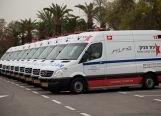He was battle weary. The battle was not taking place in Gaza but in a lonely hospital bed, far from his home, far from the familiarity of all he had known. But he was giving it his all. For the sake of his young wife and his small children. They need him. They need him alive, the strong pillar that they all leaned on. Eons ago, in a different world.

And now he was being given a reprieve. His doctors allowed him a few hours away from the hospital. A few hours of normal life. “The kosel,” he said with no hesitation. “The kosel to daven (pray) to the only One who can cure me.” And so it was. With the Ezer Mizion Ambulance Division working out the myriad logistics, he, together with two of his sons, both under Bar Mitzvah, spent two full hours praying, pleading with their Creator for LIFE.
The boys re-bonded with the father that they had spent so little with lately, comfortable enough to ask uncomfortable questions, “Abba, when you leave the hospital, will you buy a wig to cover your head?”
Then it was over. Time to return. But our young hero felt otherwise. When he came back to the ambulance, totally exhausted, he asked in a voice that was barely audible: “If possible, instead of going directly back to the hospital, could you bring me to my home in Bnei Brak for a few hours? The release from the hospital and the trip to the Kotel weakened me physically, but strengthened me emotionally. I want to go up to my home and see my wife and other children. Would you be so kind as to… “
The driver looked at his client with his eyes and he looked at him with his heart. And, armed with permission from the hospital, he agreed.
Where was home? Home was hours away. Miles and miles of more driving. But what joy for the family! What joy for the father! What emotional strength for the father’s spirit. Emotional strength that will join together with the body and help win the battle. Each mile was traversed with prayer. May Hashem answer their t’filos (prayers) b’korov (speedily).
Shlomi Porgess, the driver, is an example for all of us to emulate, an example of chessed and caring and willingness to go beyond the call of duty. The Ezer Mizion ambulance team is a model for compassion and flexibility, going beyond the call of duty to bring relief, support, comfort and fortitude to people who are dealing with difficult health situations. A lonely holocaust survivor in need of transportation to the clinic receives so much more as they drive away — interest in his life, an offer to stop at a favorite spot, respect, dignity. In a terrorist attack when all civilians are running away, it is the trained Ezer Mizion ambulance drivers who are running towards. Desperate to help and save lives. Ezer Mizion: We’re there when it hurts.
